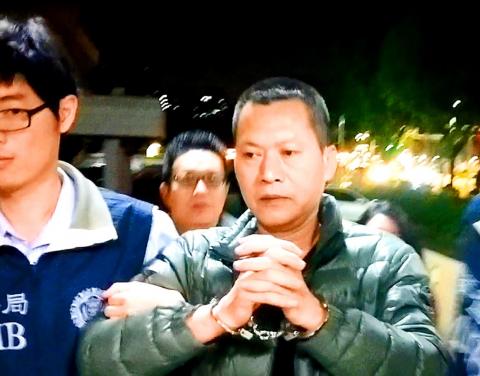The New Taipei City District Court yesterday ordered the detention of a Taiwanese businessman accused of attempting to recruit judicial and government officials to develop a spy network for China in Taiwan.
The suspect, Hung Chin-hsi (洪金錫), has been charged with violating the National Security Act (國家安全法) and detained with limited communication to prevent him from fleeing the country, prosecutors said.
New Taipei City authorities received a tip-off and Hung was placed under surveillance for more than a year, prosecutor Liu Wen-han (劉文瀚) said.

Photo: Chen Wei-tzu, Taipei Times
Hung was arrested in the city’s Tucheng District (土城) on Wednesday, Liu said.
A native of Macau, Hung came to work in Taiwan in the 1980s and later obtained Republic of China citizenship.
Hung returned to Macau in 2015 and set up business, which frequently involved traveling to Hong Kong and mainland China, where he is suspected to have been recruited by Chinese intelligence officials, Liu said.
A preliminary investigation showed that Chinese officials used money, along with favorable terms for doing business in China and other incentives, to lure Hung into working for them.
Hung was allegedly given the task of developing a spy network in Taiwan and recruiting influential Taiwanese to work for the Chinese government.
Hung allegedly tried to recruit a longtime friend, who is an officer at the Ministry of Justice’s Investigation Bureau (MJIB).
Starting in 2016, Hung allegedly invited the MJIB officer several times to visit China, offering the latter large sums of money and promising to introduce him to Chinese officials.
The MJIB officer reported the matter to his superiors, who launched an investigation.
The officer pretended to cooperate with Hung, accepting some valuable gifts, including gold coins, while recording conversations with Hung to gather evidence.
An investigator said it was worrying how Hung was instructed by his Chinese handlers to focus on “secondary targets,” which include university professors, journalists, media pundits and religious leaders, and recruit them to espouse pro-China unification talks and undermine the Taiwanese government’s position in the public discourse.

Alain Robert, known as the "French Spider-Man," praised Alex Honnold as exceptionally well-prepared after the US climber completed a free solo ascent of Taipei 101 yesterday. Robert said Honnold's ascent of the 508m-tall skyscraper in just more than one-and-a-half hours without using safety ropes or equipment was a remarkable achievement. "This is my life," he said in an interview conducted in French, adding that he liked the feeling of being "on the edge of danger." The 63-year-old Frenchman climbed Taipei 101 using ropes in December 2004, taking about four hours to reach the top. On a one-to-10 scale of difficulty, Robert said Taipei 101

Taiwanese and US defense groups are collaborating to introduce deployable, semi-autonomous manufacturing systems for drones and components in a boost to the nation’s supply chain resilience. Taiwan’s G-Tech Optroelectronics Corp subsidiary GTOC and the US’ Aerkomm Inc on Friday announced an agreement with fellow US-based Firestorm Lab to adopt the latter’s xCell, a technology featuring 3D printers fitted in 6.1m container units. The systems enable aerial platforms and parts to be produced in high volumes from dispersed nodes capable of rapid redeployment, to minimize the risk of enemy strikes and to meet field requirements, they said. Firestorm chief technology officer Ian Muceus said

MORE FALL: An investigation into one of Xi’s key cronies, part of a broader ‘anti-corruption’ drive, indicates that he might have a deep distrust in the military, an expert said China’s latest military purge underscores systemic risks in its shift from collective leadership to sole rule under Chinese President Xi Jinping (習近平), and could disrupt its chain of command and military capabilities, a national security official said yesterday. If decisionmaking within the Chinese Communist Party has become “irrational” under one-man rule, the Taiwan Strait and the regional situation must be approached with extreme caution, given unforeseen risks, they added. The anonymous official made the remarks as China’s Central Military Commission Vice Chairman Zhang Youxia (張又俠) and Joint Staff Department Chief of Staff Liu Zhenli (劉振立) were reportedly being investigated for suspected “serious

American climber Alex Honnold is to attempt a free climb of Taipei 101 today at 9am, with traffic closures around the skyscraper. To accommodate the climb attempt and filming, the Taipei Department of Transportation said traffic controls would be enforced around the Taipei 101 area. If weather conditions delay the climb, the restrictions would be pushed back to tomorrow. Traffic controls would be in place today from 7am to 11am around the Taipei 101 area, the department said. Songzhi Road would be fully closed in both directions between Songlian Road and Xinyi Road Sec 5, it said, adding that bidirectional traffic controls would